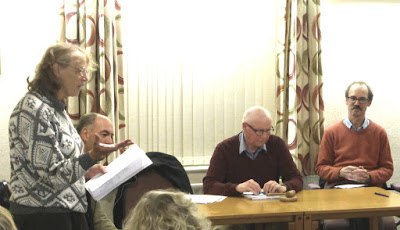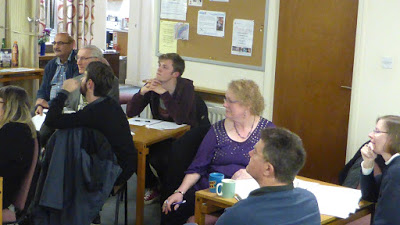Alternate Monday Evenings, Skipton (programme)We are a fun, supportive group. It's a bit like an evening class Our website
. Meetup website . ASC website Posted: 25 Oct 2016 -01535 665278/652915, 07941 785340 |
| Home |
| Contact us + Committee |
| Skipton's Best kept Secret - Read letter to the Craven Herald 7 Sept 2016 |
| What happens at a typical meeting? |
| Poster to publicise Craven Speakers Club |
| 2016: Prescription Speaking - The Timely Relaunch |
| News / Pictures |
| History |
| Pictures of 40th Anniversary Dinner 17 June 2006 |
Other nearby clubs: |
Fun BBC Recording:- Even leaders of our political parties have training and guidance in giving speeches.. See the leaked memo (Oct 2010) advising Ed Miliband how to ask questions in Prime Minister's Question Time.
Tips on debatingAfraid of taking part in a debate? Don't know what the procedure is? Worried you won't be able to think of replies, and give a summary?
I can see that
There is not space for the whole workshop. But here are three tips: 1. There is standard terminology, and a standard format The chairman should say something like: "The motion before the House tonight is 'This House ..... ' "Speaking for the Proposition we have ........ and ....,,..... " "The Opposition tonight is provided by ........ and ............. " (The chairman was given a script to help him say traditional sentences) So two people speak for the motion, two people speak against the motion, there is time for points from the floor, then one person from each side gives a summary of points. 2. Make your points very clearly separated When you make your points in favour of a motion, make them very few and very clear as separate points (even number them). This admittedly makes it easier for the opposition to refute each of the points. But that is far better than the opposition saying "Well the proposal is a muddle, they have no case". And it makes it much easier for the Judge of the competition to see what is happening. 3. Don't add extra information and ideas in the summary If you give the summary for your side, you can only include points made by the speakers and by the floor. You are not allowed to add extra ideas and information. --------------------------- The Workshop: 1. Warm up exercise and listening At the beginning of the evening Anne had us sitting in tables of four. Our table was given the pair: past and present. Another table had summer and winter; and so on. Two of the four then had to speak for 1 minute each in favour of the idea (past) and two had to oppose it (present). The topics were easy, but it really taught us to listen hard to what the previous speaker was saying so we could refute the ideas. 2. Interval Coffee, chat, strawberries and biscuits: meeting new people in the group, and visitors from other clubs. 3. Full debate Then we were shown how to run a (shortened) full debate. The chairman was given a standard text to use. We were given the mark scheme that the judges would use, and were asked to fill it in for one person - This was really helpful in seeing what judges are looking for. Our debate was "This house believes that mobile phones are killing communication." If you get opportunity to attend a debating workshop led by Anne Todd I recommend it. Find out if your local speakers' club is holding a debate
Below: Two of the debaters speak in turn
|





